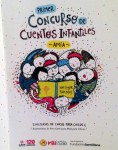Cynthia Fidel was the coordinator of AMIA’s literary contest, which resulted in the publication Primer Concurso de Cuentos Infantiles. (photo by Rebeca Kuropatwa)
When the AMIA (Asociación Mutual Israelita Argentina) bombing occurred in Buenos Aires on July 18, 1994, there was already tension in Argentina between different religious and other groups. The bombing was a sad reminder of the need for diligence – and creativity – in mitigating hatred and fear.
After the bombing, it was very difficult for people to feel comfortable enough to return to the AMIA building, especially parents with small children. Hence, the Jewish education advisor for AMIA, Gabriela Wilensky, developed a program called AMIA for Kids. On two Sundays a month, she brought in top performers to engage children and their parents in forming fresh connections between families and AMIA.
In 2014, Wilensky came up with the first literary contest for kids that would have them explore the concepts of culture and identity. The idea was to involve the greater Buenos Aires community by partnering with 40 public and private schools, with children of all religions. Recently, the literary contest coordinator, Cynthia Fidel, moved to Winnipeg with her family.
“This contest was part of the 20-year anniversary of AMIA, which happened in 2014,” said Fidel. It was open to children from 8 to 12 years old.
When all was said and done, Fidel and Wilensky received 200 story submissions. With the help of a couple of local children’s book authors, 10 winning stories were selected to be published in a book called Primer Concurso de Cuentos Infantiles (First Contest of Fairy Tales) that was published by MILA for Kids, a division of MILA publishing house.
“They talked about different problems, ideas and questions regarding cultural diversity and identity,” said Fidel. “The first prize went to a girl who wrote about cultural diversity. It’s a collection of certain ideas and questions but, above all, it’s a collection of all the incredible imaginations of the kids.”
Now there is talk of launching a second literary contest, because of the success of the first. “They were really happy about what happened with the kids,” said Fidel.
The contest, which was open to children of all origins and faiths, has sparked dialogue between the kids. The main talking point has been respecting each other’s ideas and understanding that agreement is not needed to achieve mutual respect. Fidel loosely translated one of the first lines in the book’s preface: “Nobody is the same, nor worse or better, just different.”
Primer Concurso de Cuentos Infantiles is 84 pages long and includes the 10 winning stories, as well as an extra story written by several children together.
“Some of the stories talk about some kind of conflict situation and how they solved that situation,” said Fidel. “A recurring theme revolves around how they solved it and prevailed using dialogue.”
An excerpt from the book, as translated by Fidel, reads: “There was a society where some people had curly hair, so they thought they had the right to have more time in front of the mirror, to comb their hair. But, others who had different kinds of hair thought they deserved more time. There were others who were taller and they thought they deserved to cut their hair, while short people didn’t deserve that right.
“Until, one day, a girl wished in her heart that everybody would become equal and have the same characteristics. The wish came true and the entire world became grey – colorless and boring. She wished again to have colors and differences in her world, and everybody got their characteristics back. But, now, everyone loved their uniqueness and celebrated others’ uniqueness, too.”
Fidel is a strong believer that adults can learn a great deal from children. “From my experience,” she said, “it is amazing what you can learn from kids and their reflections if you give them the opportunity to express themselves.”
Fidel said the literary contest is a great representation of AMIA as a whole, as their main principles revolve around democracy and pluralism, and creating spaces for all through communal living and coexistence. “They promote those values,” said Fidel. “I’m very proud to have worked there.”
Rebeca Kuropatwa is a Winnipeg freelance writer.

